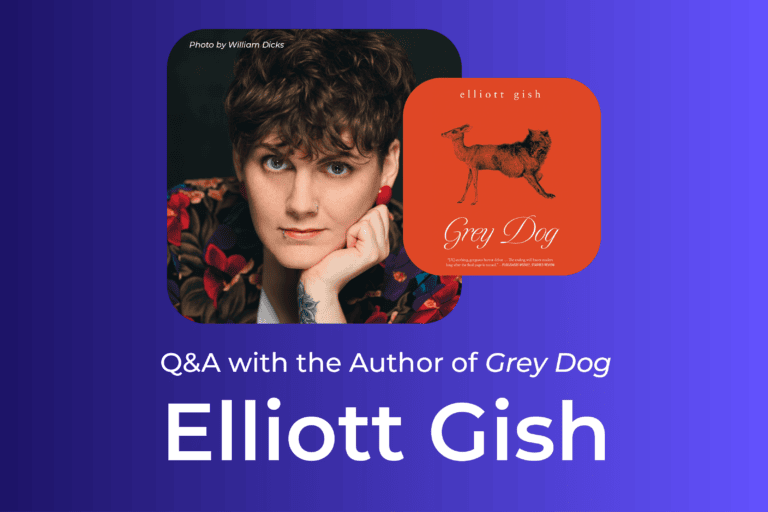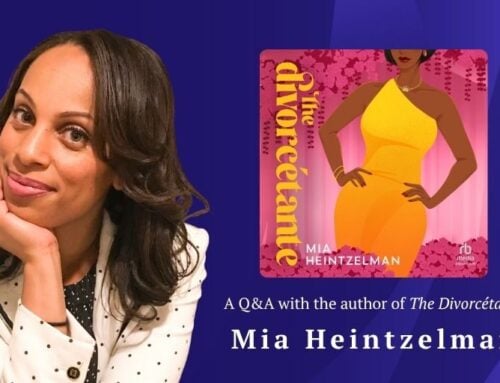
Step into the eerie world of Grey Dog with author Elliot Gish as she unveils the mysterious tale of Ada Byrd, a spinster and amateur naturalist, seeking solace in the quiet town of Lowry Bridge. But tranquility quickly gives way to strangeness as Ada witnesses unsettling phenomena that blur the lines between reality and delusion.
In a candid Q&A, Gish shares insights into Ada’s journey, from her evolving connection with nature to the challenges of portraying her descent into uncertainty. With Natalie Naudus lending her voice to the audiobook, the story comes alive, enveloping listeners in a chilling atmosphere rich with suspense.
As Ada grapples with the shadows of her past and the mysteries of the present, Gish poses a haunting question: What is the true horror lurking within the pages of Grey Dog? The Dreamscape team was lucky to get the chance to explore this question with Elliot Gish and also discuss the complex themes and characters found throughout the book…
Your protagonist, Ada Byrd, is described as an “amateur naturalist.” How does her passion for nature play into the unfolding of the story, particularly in relation to the mysterious occurrences she witnesses?
Ada’s passion for nature shapeshifts over the course of the novel. It is rooted in her childhood and begins as a compulsion to observe and experience the world. She and her younger sister Florrie are fascinated by creepy crawlies, animal carcasses, and all the gruesome stuff that field and forest have to offer, and they explore those things together (with disastrous results).
By the time we meet her as an adult on her way to Lowry Bridge, her relationship to the natural world has changed. It has become distant and scientific. Her preoccupation with nature is no longer an attempt to feel a part of the world, but an attempt to gain control over it and over herself. This is why she is so quick to reference the scientific names of the species she encounters—she relates to them by categorizing them, labelling them, trying to understand them through reason.
Over the course of the book, that dedication to rationality slowly erodes. Ada begins to realize that she can no longer relate to the world solely through reason or science; she cannot understand what is happening to her if she thinks of herself as something wholly separate from nature. The scientific approach no longer works. To make peace with her experiences, she must accept—as no good Victorian woman is meant to do—that she is an animal, a part of the natural world rather than above it.
Ada’s journey involves grappling with what is real, delusion, and traumatic memory. How did you approach writing her descent into confusion, and what challenges did you face in portraying this psychological unraveling?
I wanted to explore Ada’s psychological state largely through her voice. At the beginning of the novel, which is in the form of Ada’s diary, her writing is restrained and almost prim, with occasional bursts of intense emotion breaking through her shell of middle-class Victorian reserve. As the story unfolds, those bursts of emotion became more frequent, and I tried to mirror her mental and emotional unraveling textually by making her entries choppier and more disjointed. Her sentences become shorter and less aesthetically pleasing. She stops writing in the middle of paragraphs. She forgets dates. Even when Ada does not say outright that she is struggling, or that she is beginning to lose track of what is real, the reader will be able to understand that that is what is happening based on how she is writing in her diary. My biggest challenge in portraying this was the restriction of the diary format—it is an inherently limiting form, because you have only one point of view and one voice to work with. It was a lot of fun coming up with ways to circumvent those limits!
Natalie Naudus narrates the audiobook version of your novel. How do you feel her narration enhances the storytelling experience, particularly in capturing Ada’s voice and the atmosphere of the narrative?
I cannot say enough wonderful things about Natalie—she did an amazing job! She starts reading in such a smooth, calm voice, with only the occasional hint of anxiety and hesitation. She brings Ada to life as her rational schoolteacher self, the one who learns the scientific names of trees and brings her students out for bracing nature-walks. Later, when things get stranger and wilder, she gradually introduces a more frantic and frazzled edge to her delivery, and that smooth, modulated tone becomes far more sinister. As the book ends and Ada finds herself seduced by the grey dog, Natalie infuses her words with a sort of lushness and sensuality that beautifully complements the text. She was the perfect narrator for this book.
Audiobooks offer a unique way for readers to experience a story. How do you think the auditory format influences the reader’s engagement with the text, especially in a narrative rich with atmospheric elements like yours?
The audio format really enhances a story like this one, because listening to an audiobook is such an intimate experience, and reading a diary is an intimate experience as well. Grey Dog is entirely from the point of view of a single, limited, and ultimately unreliable narrator, telling the story of how she finds liberation in ferality. When I wrote the book, I felt like I was in the room with Ada, listening to her talk to herself. What better way to illustrate that than by having a single person whispering in your ear for hours? Reading a ghost story is scary, but isn’t it scarier, somehow, when your friend whispers that same story to you in the dark?
The novel poses the question: “What is the real horror?” How do you hope readers will interpret and engage with this question, especially in relation to Ada’s journey of self-discovery?
I hope that readers will interpret and engage with it in whatever way makes the most sense to them! A writer’s understanding of their own work is by no means the only valid understanding of said work, after all. But the way that I personally interpret that question is that the real horror isn’t necessarily Ada, or the grey dog, or “nature red in tooth and claw,” but repression: the repression of grief, the repression of sexuality, the repression of women in general and women in the early 20th century in particular. Horror is whatever we don’t let ourselves talk about, or think about, or feel. Those things make themselves known, one way or another; the things that we lock out of the houses of our souls eventually come back to knock at the door.

Want to hear even more about Elliot Gish’s Grey Dog audiobook? Start listening to an excerpt here, or download your copy everywhere audiobooks are sold, such as Audible, Apple, Libro.fm, and at your local library through apps like hoopla and Libby.






